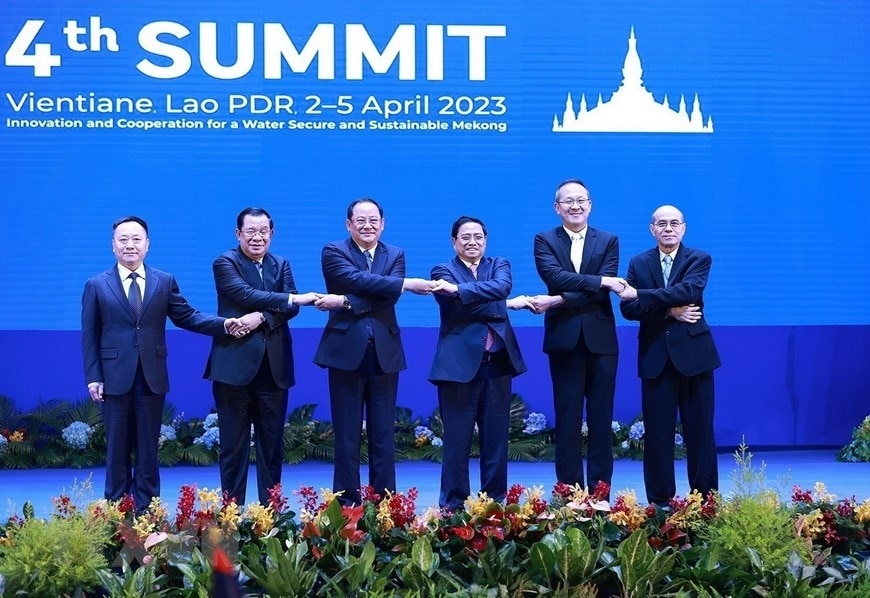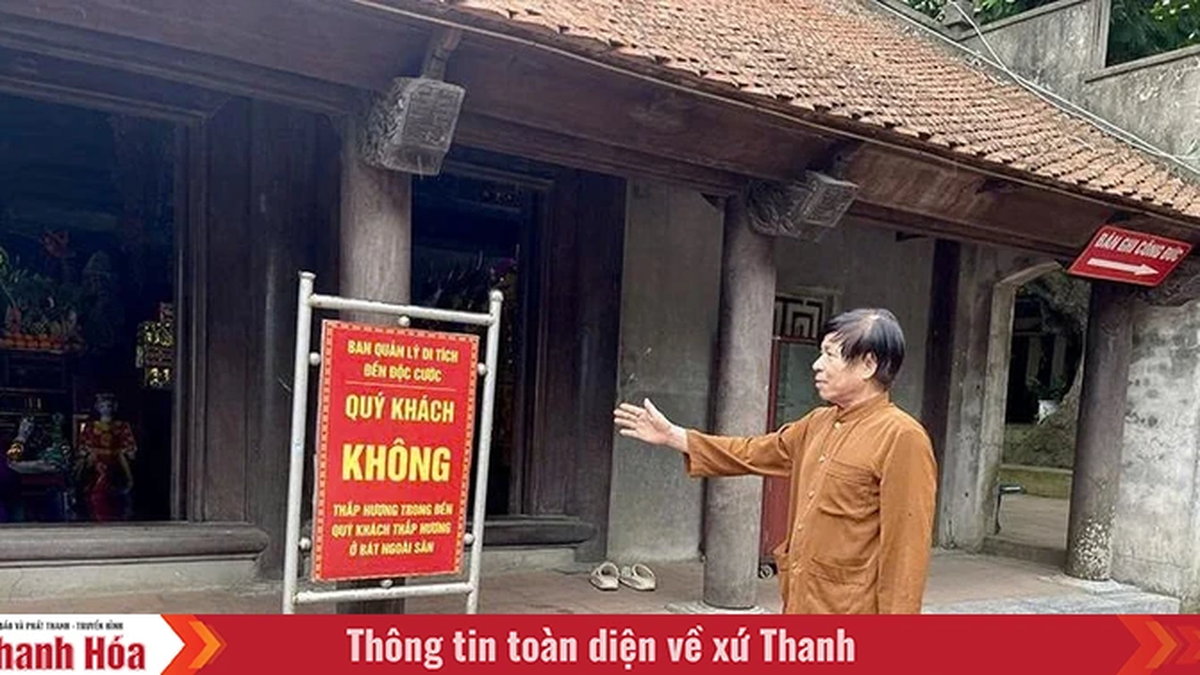 Prime Minister Pham Minh Chinh , Cambodian Prime Minister Samdech Hunsen, Lao Prime Minister Sonexay Siphandone and Secretary General of the Thai National Water Resources Office Surasri Kidti Monton with representatives of partner countries, dialogue and take a group photo.[/caption]
Prime Minister Pham Minh Chinh , Cambodian Prime Minister Samdech Hunsen, Lao Prime Minister Sonexay Siphandone and Secretary General of the Thai National Water Resources Office Surasri Kidti Monton with representatives of partner countries, dialogue and take a group photo.[/caption]Along with Prime Minister Pham Minh Chinh, the conference was attended by the Prime Ministers of Laos and Cambodia and the Secretary General of the Office of Water Resources of Thailand; leaders and representatives of dialogue partners, development partners, international and regional organizations, social and community organizations.
At the end of the conference, the parties issued the Vientiane Joint Declaration. The People's Army Newspaper respectfully introduces the full text of this Joint Declaration: Preamble We, the Heads of Government of the Kingdom of Cambodia, the Lao PDR, the Kingdom of Thailand and the Socialist Republic of Vietnam, gathered in Vientiane, Lao PDR, to attend the 4th Summit of the Mekong River Commission (MRC) and: Recall the Agreement on Cooperation for the Sustainable Development of the Mekong River Basin signed in 1995 (referred to as the 1995 Mekong Agreement) and the establishment of the Mekong River Commission by representatives of the Lower Mekong Governments, with a basin-wide vision and based on the history of Mekong cooperation since 1957 along with the establishment of the Lower Mekong Basin Research and Survey Coordination Committee. Acknowledging the priority actions and commitments from previous MRC summits and their relevance to MRC Member Countries, since the First Summit held in 2010 in Hua Hin, Thailand, under the theme “Meeting Demand, Maintaining Balance: Towards Sustainable Development”, the Second Summit held in 2014 in Ho Chi Minh City, Viet Nam, under the theme “Water, Food and Energy Security in a Changing Climate” and the Third Summit held in 2018 in Siem Reap, Cambodia, under the theme “Enhancing Joint Efforts and Expanding Partnerships to Achieve the Sustainable Development Goals in the Mekong River Basin”; Recognizing the importance of the Mekong River Basin's contributions to water-related sectors in the United Nations 2030 Agenda for Sustainable Development, the Paris Agreement on Climate Change, the Sendai Framework for Disaster Risk Reduction 2015-2030, the ASEAN Agenda for Regional Integration, Connectivity, and Narrowing the Development Gap in the ASEAN Community, and the need for a strong recovery from Covid-19 in the context of changing and increasingly complex international and regional challenges, thereby continuing to affirm the value of multilateral cooperation; Recognizing the growing urgency of the challenges, risks and opportunities facing the Lower Mekong Basin countries now and in the future due to the impacts of development activities and the effects of climate change, that optimal water resources management to ensure water security for the Mekong River Basin is crucial to achieving environmental and socio-economic stability for the communities living in the basin, but that new ideas and innovative ways of cooperation are needed to adequately address the increasing risks and trade-offs associated with basin development and management; Noting that opportunities for ensuring water, food and energy security for all Mekong countries can be enhanced through regional cooperation and concerted efforts by all countries; Stress the importance of a strong, financially sustainable, treaty-based river basin organization in the face of the continuing institutional and organizational changes in the Mekong River Basin for effective management of water and related resources; Welcome greater participation of all riparian countries in the sustainable management and development of the Mekong River Basin in a spirit of friendship and cooperation; Appreciate the participation and commitment of dialogue partners, development partners and other partners of the commission; Reaffirm our highest political commitment to the effective implementation of the 1995 Mekong Agreement and the role of the commission as the premier regional water resources diplomacy and cooperation body and a knowledge hub in enhancing the implementation of basin-wide strategies, procedures, technical guidelines, and data and information sharing, thereby promoting peaceful and mutually beneficial cooperation to achieve our shared vision of an economically prosperous, socially equitable, environmentally sound and climate resilient Mekong River Basin. Achievements since the Third MRC Summit As Heads of Government of the MRC Member Countries, we: Note the important achievements and developments of the MRC in recent years, including its continued contribution to peaceful cooperation, mutual benefit and sustainable development in the Mekong region through dialogue and cooperation among Member Countries and with partners, in particular: Enhanced knowledge generation and sharing have supported more effective planning and decision-making as demonstrated in the 2018 State of the Basin Report, as well as in technical studies and assessments including joint studies with China, Myanmar, the International Water Management Institute, the United Nations and other partners; Regional guidance for national plans for more sustainable basin development and management of water and related resources, through the 2021-2030 Basin Development Strategy, finalizing and initially implementing sector strategies on sustainable hydropower, environmental management and drought management, updated guidance on mainstream dam design and transboundary environmental impact assessment guidance; Strengthening key partnerships, including with dialogue partners, development partners of the commission and other regional cooperation mechanisms, including ASEAN, the Lancang-Mekong Cooperation, the Mekong-US Partnership, the Mekong-Japan Cooperation, the Mekong-Korea Cooperation, and other stakeholders with specific agreements; improving public consultation and outreach processes, regional forums and dialogues; enhancing data and information sharing among member countries, of China; and enhancing joint activities; Shift to proactively identifying regional investment solutions and proactively responding to basin challenges, including coordination in hydropower, irrigation, navigation and other sustainable water resources development activities, coordination in the management of water exploitation and use projects and improving the implementation of commission procedures to address transboundary impacts and operational issues; Support to reduce adverse impacts on vulnerable communities from floods and droughts through the establishment of more accurate flood and drought forecasting systems with modern tools, along with cooperation in early warning and disaster preparedness through integrated flood and drought management; Strengthen support for national planning and decision-making through improved data and information management including the development of a more sustainable Mekong River Monitoring Network to support regional and national river monitoring, modelling and communication systems, and regional and national decision support systems that are tailored, innovative and timely to address current and urgent needs; and Building an international Mekong River Commission owned and led by the Member States, with close guidance from the Council and the Joint Committee, with a Secretariat Chief Executive Officer and experts from the Member States, with its headquarters in Vientiane and a Regional Flood and Drought Management Centre in Phnom Penh, and increased financial contributions from all Member States has put the organization on track towards capacity and financial self-sufficiency in the performance of its core river basin management functions by 2030. Expressing appreciation for the continued technical and financial support from development partners, international organizations, the private sector and other relevant partners to the commission and its Member States, as well as the cooperation of the commission’s dialogue partners and all relevant stakeholders in achieving these achievements; Noting that these achievements have laid a new and improved foundation for the commission to fully implement its core mandate and functions as a river basin organization by: (i) supporting optimal and sustainable development, while enhancing regional water security and building resilience to climate change, (ii) supporting national planning from a basin-wide perspective and coordination of basin activities, (iii) providing continuous and transparent information on the current and near-term state of the basin to support improved early warning, (iv) enhancing national ownership and capacity to perform core functions of river basin management, and (v) further developing the commission's institutional arrangements to achieve a higher level of regional cooperation in addressing basin challenges. Opportunities and challenges in the region As Heads of Government of the Commission Member States, we continue to: Recognize the significant opportunities for sustainable development in all water-related sectors, including hydropower, irrigation, navigation and others, and that ensuring water security to protect communities from water-related risks, particularly floods and droughts, needs to be taken into account in other investment sectors and should also be seen as a development opportunity; Recognizing that while the development and use of the Mekong River water resources contributes significantly to economic growth, it can also have adverse impacts on the basin environment and vulnerable communities, including transboundary impacts that need to be addressed jointly, particularly where impacts are exacerbated by climate change, such as severe flooding and drought, riverbank erosion and siltation, the effects of erratic fluctuations in water levels and flows in some parts of the basin, and the degradation of environmental values and decline in fisheries resources due to the fragmentation of the river; and Affirming that to address the increasingly complex challenges of the basin, we need both management and development solutions to ensure environmental resource sustainability, identifying different investment solutions and taking into account the linkages between water-using sectors, supplementing operational management, including transboundary inter-reservoir operational management, especially the timely and regular sharing of operational data from water exploitation and use projects, identifying joint investment projects that contribute to ensuring water, food and energy security. Priority Action Areas We call on the commission, all partners and stakeholders to work together to find innovative solutions to address these challenges, while seizing opportunities and strengthening cooperation for a sustainable and water-secure Mekong River Basin, while adhering to the principles of openness, transparency, inclusiveness, mutual benefit, equality, consultation, coordination, cooperation, respect for sovereignty , with a focus on: Based on a proactive and adaptive basin development plan, identifying meaningful national and joint investment projects for the whole basin, and related support activities to enhance mutual assistance and reduce community vulnerability at the basin and national levels, and providing comprehensive responses to climate change, including structural solutions, natural adaptation solutions, environmental constraints, sediment management, supporting the implementation of other sectoral plans such as energy production, renewable energy, connecting and upgrading regional power transmission networks, developing energy markets and trading activities, and multimodal transport hubs; Supporting countries in helping communities adapt to river fluctuations by ensuring a seamless communication system to promptly and effectively report irregularities, water quality issues, floods and droughts and other water-related emergencies, and aiming to increase the timely and regular sharing of operational data on water use projects to enable better preparedness and response; Supporting development and operational decision-making through the increased use of technology in all river basin management functions from monitoring, supervision and operational management to assessment and long-term strategic planning; Ensure that consultations are conducted more effectively through a basin-wide stakeholder forum jointly organized by the commission and dialogue partners, and strengthen and innovate joint activities with other regional cooperation forums, development partners, communities, non-governmental organizations, the private sector, and other relevant stakeholders; Strengthen basin-wide management based on the commission’s mandate through innovation in policies, technologies and cooperation mechanisms, and partnerships with other relevant regional cooperation frameworks; Maintain and seek new financial resources to support the above efforts including public and private sources, and global financial support mechanisms; and Ensure that the commission is on a sustainable path to self-reliance by 2030, through continued institutional development to strengthen the capacity of the commission and relevant national agencies, ministries and sectors to implement its core functions of river basin management, including the collection and monitoring of water-related data by joint basin expert groups, the development of a financially efficient Mekong River Monitoring Network, the strengthening of the commission’s procedures and related mechanisms, working methods, and the application of regional guidelines and strategies. Moving forward We reaffirm our commitment to work together to further strengthen the role of the commission in ensuring water, food and energy security, and the economic, social and environmental sustainability of the Mekong River Basin. We welcome the strategic shift towards proactive and adaptive basin planning and coordinated management of the facilities, and call on all basin countries, partners and stakeholders to continue to work with the commission to uphold the 1995 Mekong Agreement and its related procedures, and to support the implementation of the 2021-2030 Basin Development Strategy in line with this Joint Statement and in line with the “Mekong Spirit”. We task the commission to coordinate and monitor the implementation of this Joint Statement. We express our sincere gratitude to the Government of the Lao PDR for hosting the 4th Mekong River Commission Summit, and we look forward to the 5th Mekong River Commission Summit to be held in 2026 in the Kingdom of Thailand. Adopted in Vientiane, Lao PDR, on 5 April 2023 in English. VNA



















































![[Maritime News] More than 80% of global container shipping capacity is in the hands of MSC and major shipping alliances](https://vphoto.vietnam.vn/thumb/402x226/vietnam/resource/IMAGE/2025/7/16/6b4d586c984b4cbf8c5680352b9eaeb0)













































Comment (0)